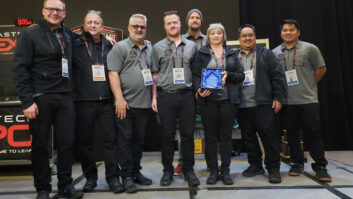EDITOR’S NOTE:
This interview of of the late
Sidney Harman, who died on Tuesday, April 12, with
TWICE senior editor Joseph Palenchar appeared in
our August 4, 2008 issue. As a tribute to the CE Hall
of Famer an excerpt of the original interview appears
below.
WASHINGTON —
Few people can speak about the
consumer electronics industry from the perspective of
Sidney Harman, the Consumer Electronics Association
Industry Hall of Fame member whose industry career
spans almost 70 years.
On the eve of his retirement from active involvement
in the consumer electronics industry, Harman spoke
with TWICE to discuss the industry’s evolution and
potential.
LESSONS LEARNED
TWICE:
What lessons has the CE industry learned
over the years, and what lessons hasn’t it learned?
Harman:
The one thing that clearly has not changed
in half a century is a combination of opportunity that is
rare, and in some respects
unique, to the consumer
electronics industry, a
combination of opportunity
and the reward that comes
to genuine innovation. The
opportunity arises out of
the fact that much of the
industry is devoted to the
reproduction of either the
visual or the audible signal,
in voice or picture, and
certainly with respect to
music.
Music is the equivalent
of cultural oxygen. So the
opportunity for visual and
audio reproduction in an ever-improving fashion is the
essence of the industry, and that is a wonderful essence.
People in the perfume industry wish they could
have it the same way.
The reward for innovation has been demonstrated
over and over again going back to my earliest days
when we, among other pioneers, determined that the
three-tube AC/DC radio was inadequate to the opportunity.
And clearly, people were utterly astonished when
they listened to the music with which they were familiar
— not Strauss and Zarathustra but Frankie [Sinatra]
singing. When they listened to that, as they typically
did on their little radios or on their large cabinet phonographs
— which were really nothing more than disguised
three-tube AC/DC devices — then when they listened to
it on our elaborate equipment, they were utterly astonished.
“Where is he [Sinatra]?” was the not-infrequent
question as people would walk into these little rooms of
ours [at early electronics shows] and listen to their first
Harman Kardon experience.
That’s little different from the response to the iPod.
The opportunity is always there. The responsiveness to
innovation, which is responsive itself to the way people
live their lives, is always there, and there is no doubt in
my mind that it will continue to be always there.
Now I made a comment just now that I think is central
to the industry, certainly central to my thinking. What
you need in marketing is anthropologists, people who
interpret the way consumers live, not people who decide
how they ought to live, but people who understand
the changing habits and lifestyles of consumers and
respond with products and services to that changing
lifestyle and that changing need. Those are the companies
that are invariably successful. The companies that
determine unilaterally, the companies that act out of a
kind of engineering triumphalism — that we know how to
do it and therefore this is what the consumer ought to
have — are the companies that turn out monstrous duds.
TWICE:
Do you think Apple with its iPod was a company
that looked at things in anthropological terms?
Harman:
Oh yes. Look at the product. Look at the
timing. See the consumer response. And I think it’s pretty
evident they know how to do that more than once.
TWICE:
You mentioned in your book “Mind Your
Own Business” that it is difficult to create and maintain
a successful brand. Why is it so difficult?
Harman:
That’s an interesting but extraordinarily
complicated question. One reason is that success can
often breed failure. Success can lead to complacency
so easily. And success can persuade you that you’ve
got it knocked. You know how to do it. If the world stood
still, the probability is that if you were successful in a
particular approach, you had it knocked. The world
doesn’t change. You keep
it knocked.
But if you stay with what
you’ve got while the world
is changing, and peoples’
lives are changing, and you
are unresponsive to those
changes, you don’t have it
knocked. You’re knocked.
It’s not difficult to imagine,
it’s not difficult to recognize
by now, that companies
and people can get
comfortable while it’s going
nicely. They persuade
themselves there is only
one answer, and I’ve got it.
And that, of course, is the road to ruin.
Then it is fair to say success can breed failure in another
way. A company grows. It develops a set of obligations
to deliver, to produce, to be effective. If it’s a
public company, it’s to perform financially. And those
pressures tend to lock in the model. Think about it in
terms of technology or engineering. You build a company.
It’s doing well. You spend a significant percentage
of revenue in engineering, but in a curious way, the
better the company is doing, the higher the percentage
of the engineering monies you spend in sustaining technology,
and in effect, it can detract. In doing well, you’ve
got to keep this thing moving, but the stuff that is driving
this thing is the current state-of-the-art technology.
Where does the new disruptive leapfrog technology
come from?
Now it’s not impossible to imagine an existing successful
company doing it. Your Apple example is a very
good one, but you can see why, in effect, it’s more a
challenge to an existing successful company than it may
be to a start-up company, one without both positive and
negative baggage of history and success.
HOME AUDIO PROSPECTS
TWICE:
Will products such as iPod speaker systems
and audio networking products help established
audio brands survive?
Harman:
Yes. And certainly, a matter of consequence
is the ability to get seamless connectivity in a
system that reflects the way in which we live, and to be
able to do it effortlessly is something that people need.
It’s an aspiration that makes sense.
TWICE:
Do you think the home audio industry has
moved too slowly to embrace some of these products
and consumers’ lifestyle changes?
Harman:
Some companies have a history of responding
effectively. Some companies don’t. Back to
an earlier comment, the truth is it is often easier for a
small new start-up company, unburdened by obligations
or responsibilities to sustain existing product lines, to
respond effectively to change.
TWICE:
Are established audio brands losing awareness
of younger consumers who believe the iPod is the
be-all and end-all of music reproduction?
Harman:
Decades ago, a wonderful writer, H.L.
Mencken, said, “For all these serious problems, there is
one single, simple solution. And it’s wrong.”
The iPod has some limitations. You know what they
are. Digital has some limitations. You know what they
are. But there isn’t any doubt at all that the general digital
world, and iPod is an expression of it, has multiplied
enormously the interest, the appetite, the accessibility
of music. Anybody in the industry has to say that whatever
does that is a good thing. Right?
I’m saying simply that when you use the iPod less as
a specific and more as a general expression of what the
technology and marketplace have generated, it is clear
that today there are more people listening to more music
everywhere on earth. As that happens, it increases
the number of opportunities for firms offering specialized
equipment to do the job better.
KEEPING IT SIMPLE
TWICE:
In your book, your mantra was simplicity in
meeting a consumer’s needs, that technology must be
subordinated to people it serves. Did that lead you to introduce
the first mono receiver and first stereo receiver
in the 1950s?
Harman:
In its most fundamental terms, that story
says the technology is there to serve the customer, not
to terrify, not to intimidate the customer. That’s a mindset
of colossal importance. If management and engineering
believes it’s there to show off how damn smart
we are, you get a product with so much complexity that
it baffles the consumer. If the mindset of management
is that technology in effect needs to be doing its magic
without the consumer really being aware of how it does
it, and having the process intuitive and transparent, then
if that is the mindset, you produce a very different kind
of product. I don’t work for technology — technology
works for me. I’m the subject, not the object, of technology.
That’s the first thing.













